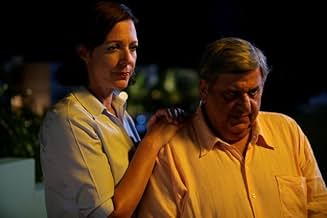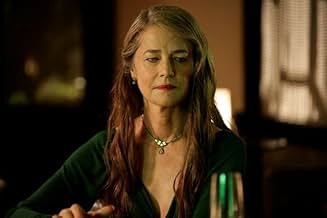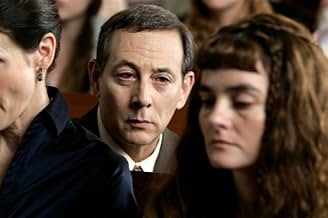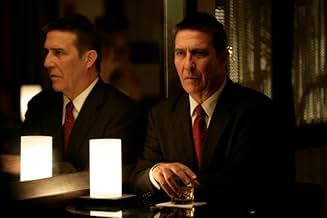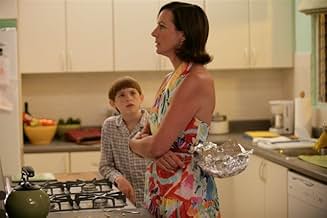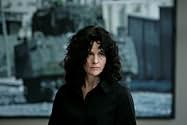अपनी भाषा में प्लॉट जोड़ेंFriends, family, and lovers struggle to find love, forgiveness, and meaning in an almost war-torn world riddled with comedy and pathos.Friends, family, and lovers struggle to find love, forgiveness, and meaning in an almost war-torn world riddled with comedy and pathos.Friends, family, and lovers struggle to find love, forgiveness, and meaning in an almost war-torn world riddled with comedy and pathos.
- पुरस्कार
- 3 जीत और कुल 9 नामांकन
- Wanda
- (as Gaby Hoffman)
फ़ीचर्ड समीक्षाएं
Recasting everybody has the weird sense of an alternate universe. It makes this a weirdly unreal movie. I can't say that the actors are inferior but they are different. I'm not a big fan of Happiness and this doesn't change that. I can't find any rooting interest in any of these characters. Some are downright kill worthy. The discussion between Trish and Timmy is so pathetic that it's almost funny. At least, it was memorable.
All the actors in the new film were much paler than the ones playing the same parts in "Happiness". The only appealing one was Shirley Henderson playing Joy (even if I missed Jane Adams dearly). The one playing Trish was nowhere near as good as the original actress, but the part was not as funny either.
Why make a follow up movie without the original cast? It would have been great to see them having aged like their characters. I suppose the actors from Happiness didn't like the script for "Life during Wartime"!
This is a less consistent film than its predecessor, particularly in terms of tone. Happiness harboured an almost garish John Waters trash aesthetic, whereas Wartime often shifts into something more sombrely lit and handsome, even entering noir territory at times, as when Ciaran Hinds' Bill and Charlotte Rampling's Jacqueline meet in a whisky-coloured bar to do semantic battle before indulging in a bout of loveless sex.
The characters are mostly horror movie monsters masked in the fascia of suburban admissibility - none more so than Trish (Allison Janney), the selfish mad-mom who is delighted by the fallacy of the nuclear ideal, lusting after "normal". Her son, Timmy (Dylan Riley Snyder), is the traumatised voice of reason: a humanist on the cusp of corruption. Then there is Joy (Shirley Henderson), a deep-feeling adult alone amidst the animal chaos: frail, fragile and bereft (in mind and body); in search of absent metaphysical guidance; a closed book desperate to do good; desperate to stop pretending any more.
Loneliness, rape, suicide and despair all echo in a bubble of carefully constructed sentimentality. Wartime doesn't quite carry the joke all the way. Certain latter scenes, particularly involving Hinds' recently-released Bill, are played disconcertingly straight. But then this is a film about the pathology of forgiveness (the film's former title), the corrosive nature of trauma, and the final consolation of repression and faith - themes in which perhaps even Mr Solondz couldn't find the humour.
"You die for me and I will know you love me," says Allen (The Wire's Michael Kenneth Williams) from the grave. No one in American cinema is better than Solondz at highlighting fickleness and absurdity of human interaction, and the paradoxes we contrive for ourselves. And although it can be wearying to endure such an indictment, we will always need filmmakers willing to float like faecal matter in Hollywood's homogenous soup.
Here the story surrounds the life of a kid and the members of his family that are trying to discover the meanings of when and how could people achieve the joy or the happiness in their lives just forgiving or forgetting something harmful enough to be forgotten or forgiven.
As always, Solondz plays with dark humor all the time just to relieve the weight of complex dramatic themes, giving the right balance needed to make real hard life discussions into something as ordinary as a breakfast.
The characters are well constructed and it's interesting the way they lead with the relationships between them. All the time 2 characters are discussing in a table or with something between them, using it like a place where they can put and throw - or sometimes hide - all their problems and differences but at the same time blocking and impeding the reaching of each other, like a battlefield.
Words are like guns and watching those characters hurting each other and using each other words like bullets is shocking because that's what we are, and we are responsible for that. Life During Wartime deals with complex themes, sometimes is a difficult movie for the raw, bitter and impacting dialogs, but you can't run away from them forever.
As another one said: "Todd Solondz is unique and so are his films. He forces you to look through an angle that we systematically ignore".
Great work once again.
क्या आपको पता है
- ट्रिवियाA sequel to Todd Solondz's movie Happiness (1998), but with entirely re-cast characters.
- गूफ़The plane has no name or identifying number on its outside, as mandated by ICAO, the international aviation agency.
- भाव
Trish: So Mark, what do you do?
Mark Wiener: Systems analysis.
Trish: That sounds interesting.
Mark Wiener: It is to me, moderately. Like intermediate level Sudoku; but I have no illusions that what I do is of interest to anyone else. Even among specialists I'm something of functionary, but without ambition, or even hope of ambition. I plateaued in grad school then lost interest except in maintaining a base salary adequate to financing a low overhead subsistence.
- साउंडट्रैकExcerpts from the original motion picture Score to Happiness
Composed by Robbie Kondor
टॉप पसंद
- How long is Life During Wartime?Alexa द्वारा संचालित
विवरण
- रिलीज़ की तारीख़
- कंट्री ऑफ़ ओरिजिन
- आधिकारिक साइट
- भाषा
- इस रूप में भी जाना जाता है
- Untitled Todd Solondz Project
- फ़िल्माने की जगहें
- उत्पादन कंपनी
- IMDbPro पर और कंपनी क्रेडिट देखें
बॉक्स ऑफ़िस
- बजट
- $45,00,000(अनुमानित)
- US और कनाडा में सकल
- $2,81,447
- US और कनाडा में पहले सप्ताह में कुल कमाई
- $30,507
- 25 जुल॰ 2010
- दुनिया भर में सकल
- $8,07,162
- चलने की अवधि1 घंटा 38 मिनट
- रंग
- ध्वनि मिश्रण
- पक्ष अनुपात
- 1.85 : 1
इस पेज में योगदान दें





